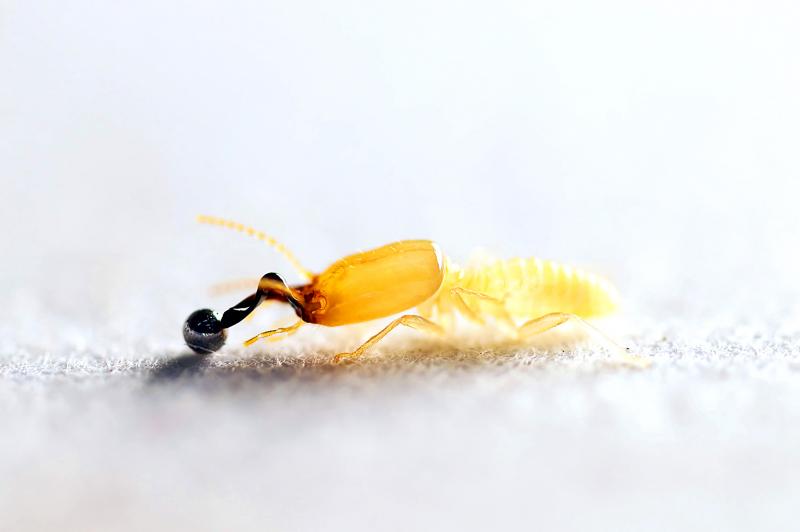A research paper coauthored by National Chung Hsing University’s departments of physics and entomology has found that Pericapritermes nitobei, a type of soil-feeding termite, can pounce on an enemy at speeds exceeding 400kph, faster than any known species of ant or other insect.
The research paper, titled “Termite’s Twisted Mandible Presents Fast, Powerful, and Precise Strikes,” was published in the peer-reviewed journal Scientific Reports on June 11.
The soldier termite of the species is equipped with twisted mandibles that can snap faster than any other known termite species, predatory ants or crustaceans, at 132 meters per second, which is equivalent to 475.2kph, the researchers said.

Photo courtesy of National Chung Hsing University
The snapping behavior of the insect was observed in a petri dish, using an ultra-high-speed camera to capture the action at 460,830 frames per second, they said.
The asymmetric mandibles of the species are proven to be more powerful and faster than symmetric mandibles, the paper said.
While it was hypothesized that asymmetric mandibles of soldier termites would deliver a more powerful strike than symmetric mandibles, as asymmetric mandibles can store more elastic energy, there was no supporting proof until now, it said.
Entomologists have long hypothesized that the powerful mandibular snapping of termite soldiers is a specialized defense mechanism against ants, but the defensive behavior had not been studied in termites with asymmetric mandibles, the paper said.
To observe the species’ snapping behavior against predators, soldier termites were forced to fight against worker yellow crazy ants (Anochetus taiwaniensis), Pa. javanus and minor worker African big-headed ants, it said.
To calculate exactly how fast and how strong the termites hit with their mandibles, professors Kuan Kuan-chih (關貫之) and Chiu Chun-i (邱俊禕) used ultra-high-speed cameras to record the termites hitting 0.7mm steel pellets with their mandibles.
Using the recordings and applying the principle of energy conservation, the team determined that the termites achieved a record in biological movement, with peak linear velocity of 89.7 to 132.4 meters per second within 8.68 microseconds after snapping, resulting in an impact force of 105.8 to 156.2 millinewtons, the paper said.
The calculation is a conservative estimate, as the study disregarded rotational energy of the metal pellet, although it assumed no energy loss due to friction, it added.

The Ministry of the Interior (MOI) is to tighten rules for candidates running for public office, requiring them to declare that they do not hold a Chinese household registration or passport, and that they possess no other foreign citizenship. The requirement was set out in a draft amendment to the Enforcement Rules of the Public Officials Election and Recall Act (公職人員選舉罷免法 ) released by the ministry on Thursday. Under the proposal, candidates would need to make the declaration when submitting their registration forms, which would be published in the official election bulletin. The move follows the removal of several elected officials who were

FOUR DESIGNATED AREAS: Notices were issued for live-fire exercises in waters south and northwest of Penghu, northeast of Keelung and west of Kaohsiung, they said The military is planning three major annual exercises across the army, navy and air force this month, with the navy’s “Hai Chiang” (海強, “Sea Strong”) drills running from today through Thursday, the Ministry of National Defense said yesterday. The Hai Chiang exercise, which is to take place in waters surrounding Taiwan, would feature P-3C Orion maritime patrol aircraft and S-70C anti-submarine helicopters, the ministry said, adding that the drills aim to bolster the nation’s offshore defensive capabilities. China has intensified military and psychological pressure against Taiwan, repeatedly sending warplanes and vessels into areas near the nation’s air defense identification zone and across

SENATE RECOMMENDATION: The National Defense Authorization Act encourages the US secretary of defense to invite Taiwan’s navy to participate in the exercises in Hawaii The US Senate on Thursday last week passed the National Defense Authorization Act (NDAA) for Fiscal Year 2026, which strongly encourages the US secretary of defense to invite Taiwan’s naval forces to participate in the Rim of the Pacific (RIMPAC) exercise, as well as allocating military aid of US$1 billion for Taiwan. The bill, which authorizes appropriations for the military activities of the US Department of Defense, military construction and other purposes, passed with 77 votes in support and 20 against. While the NDAA authorizes about US$925 billion of defense spending, the Central News Agency yesterday reported that an aide of US

NATIONAL DAY: The ‘Taiwan Dome’ would form the centerpiece of new efforts to bolster air defense and be modeled after Israel’s ‘Iron Dome,’ sources said President William Lai (賴清德) yesterday pledged to strengthen the nation’s air defense capabilities and build a “T-Dome” system to create a safety net against growing military threats from China. “We will accelerate our building of the T-Dome, establish a rigorous air defense system in Taiwan with multi-layered defense, high-level detection and effective interception, and weave a safety net for Taiwan to protect the lives and property of citizens,” he said in his National Day address. In his keynote address marking the Republic of China’s (ROC) 114th anniversary, Lai said the lessons of World War II have taught nations worldwide “to ensure that